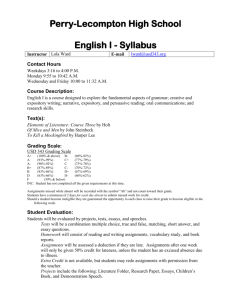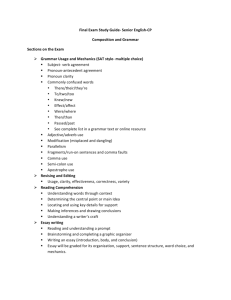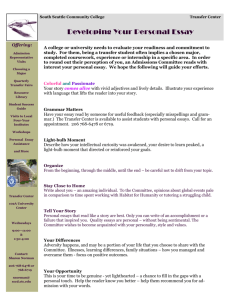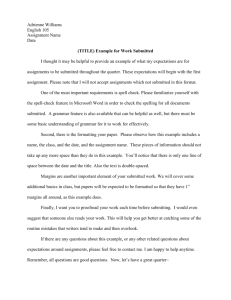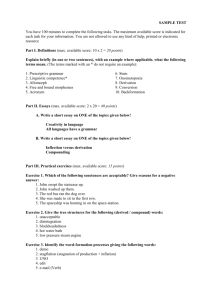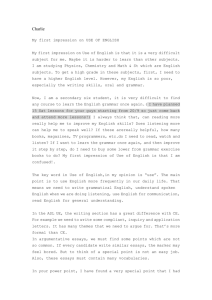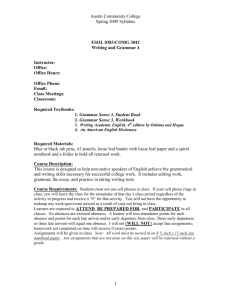Final
advertisement
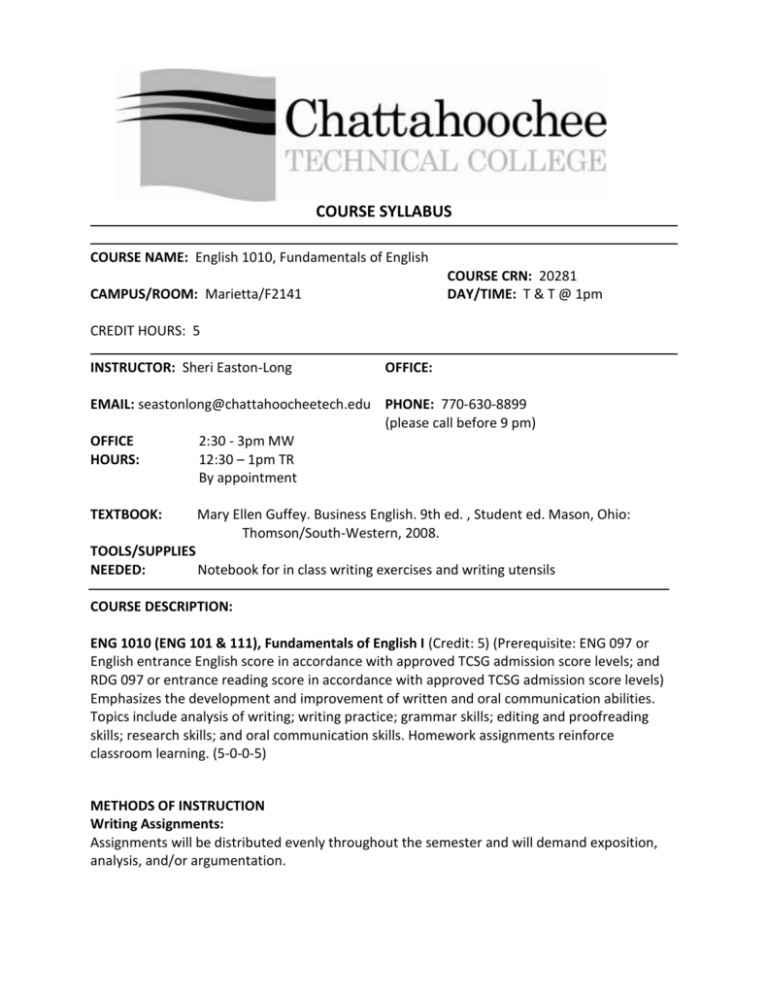
COURSE SYLLABUS COURSE NAME: English 1010, Fundamentals of English COURSE CRN: 20281 DAY/TIME: T & T @ 1pm CAMPUS/ROOM: Marietta/F2141 CREDIT HOURS: 5 INSTRUCTOR: Sheri Easton-Long OFFICE: EMAIL: seastonlong@chattahoocheetech.edu PHONE: 770-630-8899 (please call before 9 pm) OFFICE 2:30 - 3pm MW HOURS: 12:30 – 1pm TR By appointment TEXTBOOK: Mary Ellen Guffey. Business English. 9th ed. , Student ed. Mason, Ohio: Thomson/South-Western, 2008. TOOLS/SUPPLIES NEEDED: Notebook for in class writing exercises and writing utensils COURSE DESCRIPTION: ENG 1010 (ENG 101 & 111), Fundamentals of English I (Credit: 5) (Prerequisite: ENG 097 or English entrance English score in accordance with approved TCSG admission score levels; and RDG 097 or entrance reading score in accordance with approved TCSG admission score levels) Emphasizes the development and improvement of written and oral communication abilities. Topics include analysis of writing; writing practice; grammar skills; editing and proofreading skills; research skills; and oral communication skills. Homework assignments reinforce classroom learning. (5-0-0-5) METHODS OF INSTRUCTION Writing Assignments: Assignments will be distributed evenly throughout the semester and will demand exposition, analysis, and/or argumentation. Reading Assignments: In this course, you will read informative texts about the writing process and rhetorical strategies, as well as essays written by professionals and your peers. The readings play an integral role in the course—make sure you keep up with them! Participation: Our success as a class (and your success in it) depends upon your active presence and participation. This means reading carefully and critically, attending class faithfully, arriving on time and prepared, contributing to class discussions thoughtfully, enthusiastically participating in informal group works, and completing all writing assignments in a timely manner (Whew!). Please be here; we need you! Objectives: English 1101 is designed to develop the student’s ability to think critically, to read perceptively, and to articulate ideas clearly and cogently in writing and speech. Specifically, we will work to achieve this objective by providing reading, writing, and verbal experiences which, 1. Stimulate awareness of and an appreciation for insights into human nature and human society; 2. Prompt recognition of distinctions between pre-judgments and logically supported opinions; 3. Strengthen the ways students use language to communicate and relate to others; and 4. Guide students through the process of collecting, organizing, and interpreting data in documented essays. Course Requirements: 1. Each student will write four essays, two of which must be documented in the MLA styled. Essays will range in length from 500 to 1000 words. Except for in-class assignments, all essays must be typed and formatted in the MLA style. 2. Each student must complete reading and homework assignments before class time and participate constructively in class activities and/or discussions. 3. To receive credit for journal entries, each student must complete all assigned topics with thoughtful entries concerning their opinions on the topic. Grading: The following assignments will determine the final grade for this course: In-Class Writing/Editing Assignments Reflective Narrative Essay Descriptive Essay Research Paper Class Participation (homework, journal writing, research process, and discussion participation) Final Portfolio Final Average 10% 10% 10% 10% 25% 15% 20% 100% Qualities of Excellent Work: 1. Students are to compose essays that are logical, engaging, and informative, while improving on the quality of writing as the semester work continues; 2. Develop essays that include a controlling idea or thesis, provide adequate supportive evidence, and make use of effective organization; 3. Demonstrate and apply an understanding of basic rhetorical concepts including ethos, pathos, and logos, and the relationship among audience, purpose, and context; 4. Compose both single-draft and multi-draft essays, using prewriting, drafting, and revision, as well as editing; 5. Cite and document material taken from sources; 6. Construct clear, precise, grammatically correct sentences, using “Standard English,” and avoiding awkward phrasing and errors, including but not limited to the following: fragments, comma splices, run-on sentences, subject-verb and pronoun-antecedent disagreement, faulty pronoun reference, misuse of possessives, and misspellings. Chattahoochee Technical College Grading Scale Grades are issued at the end of each quarter. All grades earned will be reflected on and remain on the official academic transcript. The following grading scale is used: A B C D F 90-100 80-89 70-79 60-69 0-59 Excellent Good Satisfactory Poor Failing 4 3 2 1 0 Work Ethics Grades This grade is assigned in accordance with the Technical College System of Georgia standards. The work ethics grade will be displayed on the student’s official transcript but will not affect the academic grade point average. It is designed to evaluate and encourage good work habits. Grades of three, two, one, or zero are issued. Exceeds 3 Expectations 2 Meets Expectations Needs 1 improvement 0 Unacceptable Warranty Statement The Technical College System of Georgia guarantees that graduates of state technical colleges or participating local technical colleges have demonstrated competence in those competencies as defined by the Industry Technical Committee and included in the approved state curriculum standards. “Should any student within two years of graduation not be able to perform one or more of the competencies contained in the industry validated standard or program guide, including failure to pass a state required licensing examination, the Department agrees to provide specific retraining at any state technical college offering the program to the former student at no cost to the employer or graduate for tuition or instructional fee.” Georgia’s technical colleges take pride in being the first to offer this guarantee to our partners in business and industry. To inquire or to file claims under this warranty please contact the Vice President of Student Affairs, Marietta Campus, 770.528.4545. Disability Services Chattahoochee Technical College provides support services for students with disabilities. These services ensure program accessibility and reasonable accommodation to individuals defined as disabled under Section 504 of the Rehabilitation Act of 1973, the Americans with Disabilities Act of 1990 and the Americans with Disabilities Amendments Act of 2008. A disability is defined as any condition that substantially limits one or more of life's major activities. "Major life activities" include such functions as major bodily functions, carrying for oneself, performing manual tasks, seeing, hearing, eating, speaking, sleeping, walking, standing, lifting, bending, learning, reading, communicating, concentration, thinking, and working. The condition may be permanent or temporary. In order to receive accommodations at Chattahoochee Technical College, it is the student's responsibility to self-disclose this disability to the Disability Services Coordinator. Documentation of the disability is required and this documentation must indicate that the requested accommodations are necessary for “participation in the college's educational programs." Services provided include but are not limited to the following: registration assistance and priority registration, orientation to campus, institutional test modification, reader, note taker, use of tape recorder, copying service, assistance in obtaining books in alternative formats, assistive FM listening devices, assistive technology and software, c-print services for the hard of hearing, interpreter services for the deaf, accessible classrooms, accessible parking, and information and referral to campus and community support services. Chattahoochee Technical College strives to provide, within reason, appropriate resources, services and auxiliary aids to allow each qualified person with a documented disability equitable access to educational programs, social experiences and career opportunities. Inquiries concerning the application, policies, and practices of the American with Disabilities Act for Chattahoochee Technical College may be addressed to one of the following: • Marietta Campus – ADA/Section 504 Coordinator, Mary Frances Bernard at 980 South Cobb Drive, Marietta, GA 30060, Building G, Room 1125. Phone: 770-528-4529. Attendance Policy: Students are expected to be punctual and attend all classes for which they are registered. I will keep an accurate record of class attendance. Students anticipating an absence or tardiness should contact the instructor in advance or provide notification as soon as possible. It is the responsibility of the student to account for instructional time missed. If the student does not attend classes, submit assignments, or contact the instructor in a timely manner, a failing grade may be issued. *Note: Students who miss 5 consecutive classes without contacting the instructor will be turned in as students who have Stopped Attending. Classroom Policies: • • • • • • In the event of an absence, the student is responsible for obtaining accurate and complete notes of class lectures and discussions, as well as the nature and due dates of assignments during class periods. Students are expected to be respectful of the instructor and fellow students. Students must complete assigned readings before class time and participate in class discussions in an engaging manner. No texting in class. Politeness and respect toward all members of the class and the instructor are required. Cell phones on silent, please. There is an expectation that all students are to complete all in-class exercises. Make-up work is at the discretion of the instructor. Students are expected to submit work on time. Late work will be penalized. Final drafts of essays will go down by one letter grade if they are turned in after the date they are due. You must submit original work; neither plagiarism nor cheating is unacceptable. Plagiarism comes in many forms, some of which you may not know. “Plagiarism is defined as "literary theft" and consists of the unattributed quotation of the exact words of a published text, or the unattributed borrowing of original ideas by paraphrase from a published text. On written papers for which the student employs information gathered from books, articles, web sites, or oral sources, each direct quotation, as well as ideas and facts that are not generally known to the public at large, or the form, structure or style of a secondary source must be attributed to its author by means of the appropriate citation procedure. Only widely known facts and first-hand thoughts and observations original to the student do not require citations. Citations may be made in footnotes or within the body of the text. Plagiarism also consists of passing off as one's own segments or the total of another person's work. . . .” Any plagiarized essay (whether a part or the whole) will receive the grade of “F” and disciplinary action taken. Assignment/Class Schedule Date Week 1 10/1 Assignments Class 1 Thursday Introduction; syllabus review Writing Survey – Who are you as a writer? In-class writing – Diagnostic Writing Reading Assignment: Business English - Review Chapter One Read Chapter Two - Parts of Speech Class 2 Tuesday The Parts of Speech/Sentence Review Daily Grammar Review Business English - Complete Parts of Speech Review Begin Chapter Three - Sentence Elements, Patterns, Types Class 3 Thursday The Parts of Speech/Sentence Review Daily Grammar Review Business English - Complete Chapter Three Business English - Review of Nouns Begin Unit 2: Knowing the Namers: Chapters Four, Five, Six and Seven Class 4 Tuesday The Sentence - How they work to create meaning. Daily Grammar Review Business English - Complete Unit 2: Knowing the Namers: Chapters Four, Five, Six and Seven In class writing assignment - Identifying and Correcting Sentences. Class 5 Thursday The Paragraph - Putting it all together to make your writing work. Daily Grammar Review Business English - Begin Unit 3 Showing the Action: Chapter Eight - Verbs: Kinds, Voices, Moods, Verbals Parts of Speech - Quiz Week 2 10/6 Week 3 10/13 Week 4 10/20 Class 6 Tuesday The Paragraph - Putting it all together to make your writing work, continued. Daily Grammar Review Sentence Structure - Quiz Business English - Begin Unit 3 Showing the Action: Complete Chapter Eight Verbs: Kinds, Business English - Continue with Unit 3 Showing the Action: Begin Chapter Nine - Verb Tenses and Parts Class 7 Thursday Class 8 Tuesday Introduction to Reflective Writing - What does it mean, and how does it look? Daily Grammar Review Paragraph Structure - Quiz Business English -Continue with Unit 3 - Showing the Action: Begin Chapter Chapter Nine - Verb Tenses and Parts Reading Assignment: to be distributed in class. Continue with Reflective Writing - What does it mean, and how does it look?Daily Grammar ReviewRoad Trip! We will go to the library for an introduction to the services available.Business English -Continue with Unit 3 - Showing the Action: Complete Chapter Chapter Nine - Verb Tenses and PartsRoad Trip! We will go to the library for an introduction to the services available. Week 5 10/27 Class 9 Thursday Class 10 Tuesday Week 6 11/03 Class 11 Thursday Week 7 11/10 Class 12 Tuesday Continue with Reflective Writing - What does it mean, and how does it look? Daily Grammar Review First rough draft of reflective essay due for in class peer review. Business English -Continue with Unit 3 - Showing the Action: Chapter Ten - Verb and Subject Agreement Reading Assignment: to be distributed in class. Continue with Reflective Writing - What does it mean, and how does it look? Daily Grammar Review Second rough draft of reflective essay due for in class peer review. Business English -Complete Unit 3 - Showing the Action: Chapter Ten - Verb and Subject Agreement Introduction to Narrative Writing - How do I write when I share a story? Daily Grammar Review Final Draft of Reflective Essay Due (beginning of class). Business English -Begin Unit 4 - Modifying and Connecting Words Chapter 11 - Modifiers: Adjectives and Adverbs Reading Assignment: to be distributed in class. Begin Descripive Writing - How do I write when I wish to describe a person, place, an event, an object, or an idea? Daily Grammar Review In class writing assignment - brainstorm for narrative essay Business English -Begin Unit 4 - Modifying and Connecting Words Chapter 12 - Prepositions Class 13 Thursday Continue Descripive Writing - How do I write when I wish to describe a person, place, an event, an object, or an idea? Daily Grammar Review First rough draft of descriptive essay due for in class peer review. Business English -Complete Unit 4 - Modifying and Connecting Words Chapter 13 - Conjunctions Introduction to Research Writing - How do I write when I wish to inform or persuade my audience? How do I write when I wish to interpret meaning in Class literature, art or a scientific study?Daily Grammar ReviewIn class writing 14Tuesday brainstorming topics for the research paper.Second rough draft of descriptive essay due for in class peer review.Business English -Begin Unit 5 - Punctuating SentencesChapter 14 - CommasReading Assignment: to be distributed in class. Week 8 11/17 Week 9 11/24 Class 15 Thursday Continue with Research Writing - How do I write when I wish to inform or persuade my audience? How do I write when I wish to interpret meaning in literature, art or a scientific study? Daily Grammar Review In class writing - continue with research paper writing. Final draft of descriptive essay due (beginning of class). Business English -Continue with Unit 5 - Punctuating Sentences Chapter 15 - Semicolons and Colons Class 16 Tuesday Continue with Research Writing - How do I write when I wish to inform or persuade my audience? How do I write when I wish to interpret meaning in literature, art or a scientific study? Daily Grammar Review In class writing - continue with research paper writing. Business English -Complete Unit 5 - Punctuating Sentences Chapter 16 - Other Punctuation No Classes 11/26 Thanksgiving Holiday Class 17 Tuesday Continue with Research Writing - How do I write when I wish to inform or persuade my audience? How do I write when I wish to interpret meaning in literature, art or a scientific study? Daily Grammar Review In class writing - continue with research paper writing. Business English -Begin Unit 6 - Writing With Style Chapter 17 - Capitalization Week 10 12/1 Class 18 Thursday Week 11 12/8 Week 12 12/15 Class 19 Tuesday Class 20 Thursday Class 21 Tuesday Final Exams Continue with Research Writing - How do I write when I wish to inform or persuade my audience? How do I write when I wish to interpret meaning in literature, art or a scientific study? Daily Grammar Review In class writing - continue with research paper writing. Business English -Begin Unit 6 - Writing With Style Chapter 18 - Numbers Continue with Research Writing - How do I write when I wish to inform or persuade my audience? How do I write when I wish to interpret meaning in literature, art or a scientific study?Daily Grammar ReviewIn class writing continue with research paper writing.Discuss the research presentations. Research Presentations Research Presentations
